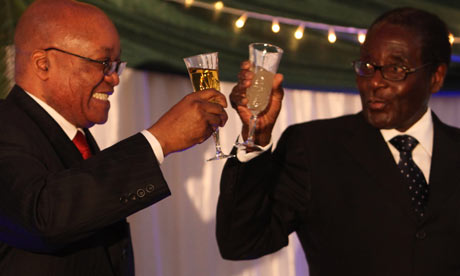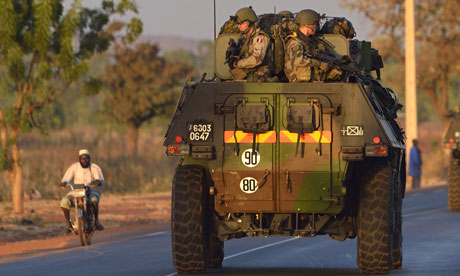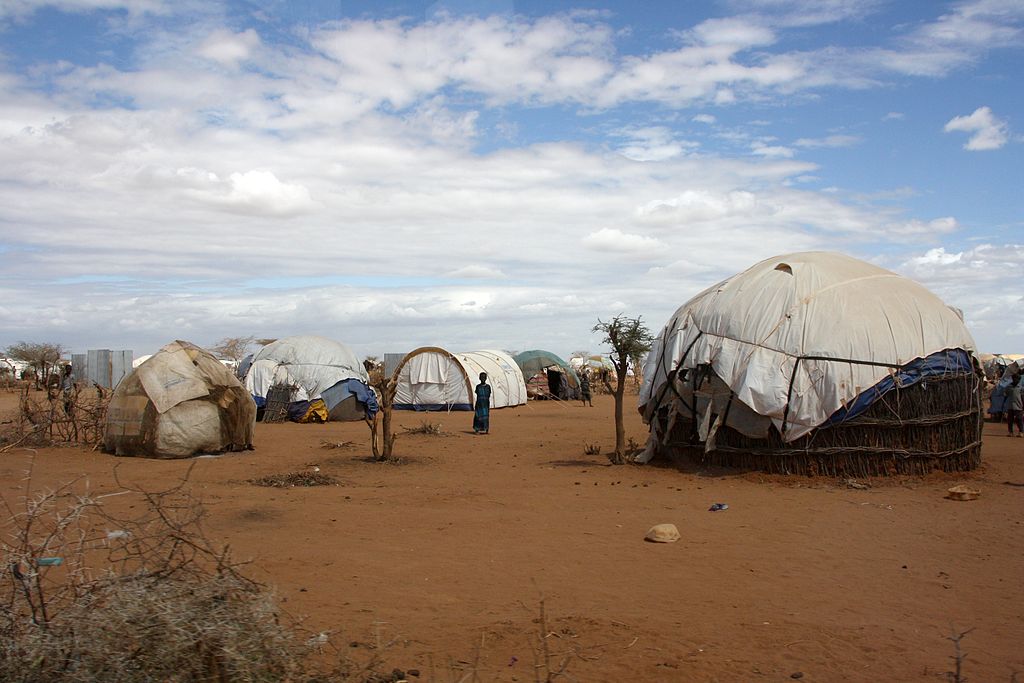In 1994, Nelson Mandela announced that South African foreign policy would forever be guided by the international pursuit of human rights and true democracy. Yet eighteen years later, the country appears to have lost sight of not only Mandela’s guidelines, but of any coherent global strategy at all. In a time when the international community is calling upon South Africa to take on a more dominant role as a regional superpower, the country is in fact more confused than ever about what values lie at the heart of its foreign relations.
It comes as little surprise that Mandela was an advocate of human rights; he has spent the majority of his life fighting against inequality and upon being elected as President, instituted one of the world’s most progressive constitutions. A 1993 foreign policy document by the ruling African National Congress (ANC) stated “the struggle to end apartheid was a global one,” and that South Africa would honour its past by pursuing a “worldwide Human Rights campaign.” And yet since Mandela left office in 1999, the ANC have pursued friendships with some of the world’s most dubious leaders.
Embarrassing bedfellows

The county’s most notorious ally on the African continent was, until recently, the late Muammar Qaddafi. From his assumption of power in 1969 until the end of apartheid, Qaddafi opposed South Africa’s white government, and provided funds and support to the liberation movements and the training of ANC combatants. After the fall of the apartheid regime, the relationship between South Africa and Libya only flourished; Qaddafi financially supported ANC electoral campaigns, and had several official visits with Mandela during his time as president. In response to criticisms over Qaddafi’s invitation to attend Mandela’s inauguration ceremony, the South African president proclaimed, “Those who feel irritated by our friendship with President Qaddafi can go jump in the pool.”
Yet Qaddafi’s support continued to attract more criticism as the years went on. He reportedly helped to pay for Winnie Mandela’s defence in a 1991 kidnapping trial, and also allegedly provided current President Jacob Zuma with $2-million to help cover the costs of his 2006 rape trial. Public disapproval of this special relationship peaked last year during Libya’s civil war. For months, Zuma and the ANC hummed and hawed over whether to stand by their long-term ally, or toe the line of NATO and the UN. In the end, South Africa did sign onto the UN resolution allowing for “all necessary methods” to be used to protect Libyan citizens. Yet Zuma proceeded to vocally criticize the NATO bombings and the violent escalation of the conflict. The ANC only officially recognized the National Transitional Council on 10 September, a month after rebels captured Tripoli. Zuma has stated that his frustration with NATO’s Libya campaign stems from the West’s “undermin[ing] of the African continent’s role in finding a solution,” having long been a supporter of finding African solutions to African problems.

South Africa’s dithering over Libya is not the only case in which the country has turned against its dedication to protecting human rights. In 2007 the government voted against a UN resolution calling on the government of Myanmar to respect human rights and begin a transition towards democracy. A year later, then President Thabo Mbeki helped to block UN sanctions against Zimbabwe’s Robert Mugabe, even though the international community had placed similar sanctions against the apartheid regime. This past year, South Africa failed to support a demand from the African Union (AU) that Ivory Coast president Laurent Gbago surrender power to Alassane Ouattara after a disputed election.
Cash rules everything around me
South Africa’s relationship with China is another hot topic in recent debates about human rights and the country’s foreign policy. For several years, China has been the driving force behind the rapid industrial development of Africa, and unlike those from the West, Chinese loans and investments come without political or economic conditions. The ties between Pretoria and Beijing have been strengthened under President Zuma, culminating in China inviting South Africa to join BRIC, now BRICS (the international organization of leading emerging economies, including Brazil, Russia, India and China). During a 2010 trip to Beijing, Zuma applauded Chinese political discipline as a model for South African economic development. In looking for non-Western paradigms of development not dictated by the IMF or the World Bank, Zuma seeks to follow the Chinese model and expand unabashedly on his own terms.
Pretoria’s recent foreign relations record has not done much for its international reputation or its relationship with other African nations. Foreign Policy magazine labels South Africa as a country that lacks a “conscience,” that’s lofty morals of the Mandela years have long since fallen by the wayside, even going as far as branding them a “sorry footprint on the world.” Others, frustrated by a foreign policy so ambiguous and confusing, now question whether a coherent international strategy even exists within the increasingly divided ANC.
The most recent example to draw media attention was when the Dalai Lama was forced to decline his invitation to Archbishop Desmond Tutu’s 80th birthday celebration because the South African government would not grant him an entry visa. This is the second time in two years that the Dalai Lama’s attempts to visit South Africa have been thwarted; observers blame pressure from China, currently South Africa’s biggest trading partner. Tutu himself remarked that the rejection of the spiritual leader is reminiscent of how blacks were denied travel permits during the apartheid years.

It is clear that Mandela’s moral compass no longer guides South Africa’s foreign policy, yet what has replaced the famed leader’s commitment to human rights is not entirely apparent. One visible trend is how the country’s expanding economy and recent addition to BRICS now takes precedence over old lofty ideals. The Dalai Lama’s visit was denied in order to protect South Africa’s trade relationship with China, and Mbeki’s government blocked sanctions against Zimbabwe out of a fear of being cut off from the country’s investment potential.
Going it alone
Another guiding principle of Mbeki and Zuma’s foreign policies has been a strong opposition to Western intervention in African affairs. While both leaders are committed to democracy, they are also firm anti-imperialists and Africanists. These two identities have come into conflict with each other in recent years, with Zuma often picking the side of the latter in foreign affairs. While South Africa’s president does criticize dictators and one-party states, he is willing to forgo the pursuit of international democracy and human rights in favour of an overriding concern for state sovereignty and African independence.
It is starting to appear that in any given conflict, South Africa will take the opposite side of the West just to prove its point. In a rare show of force, Pretoria sent a naval fleet to Cote d’Ivoire in an attempt to solve last year’s electoral dispute. However, this action went against African and Western diplomatic efforts that had already been in place for two months. The West African nation’s neighbours, led by Nigeria, were pursuing a campaign of financial sanctions and the threat of military intervention – a campaign backed by the United States, European powers and the UN. In sending its fleet to Cote d’Ivorie, South Africa acted without consulting the other regional powers involved. Similar action was taken in Zimbabwe, where Mbeki argued that he blocked UN sanctions because he believed the Security Council was stepping outside of its role. Zimbabwe was not a threat to international security, he asserted, and therefore should be dealt with by the UN Human Rights Council, not the Security Council. And then, of course, there’s Libya, where South Africa again fought against the West’s plan for intervention without presenting a coherent solution of its own.
These multiple conflict resolution blunders have severely damaged South Africa’s reputation in two ways. First, the country now appears to its African neighbours as a bully, recklessly punching above its weight in international affairs, and often without consulting other regional powers. Second, in all of the three aforementioned cases, it appears as though the country was continuing to ally itself to dubious political leaders long after international opinion had turned against them. In Zimbabwe, South Africa’s strategy was to negotiate a power sharing agreement that essentially preserved Mugabe’s rule. In communicating with Gbagbo in Cote d’Ivoire, Pretoria sent a lifeline to the electorally defeated politician that undermined international efforts to isolate the former leader. And finally in Libya, South Africans was accused of attempting to protect Qaddafi and its lucrative financial relationship with him above all else.
Looking for leadership
All of this wavering on conflict resolution policy strangely comes at a time when South Africa is attempting to broaden its regional influence and flex its muscles as an African superpower. Currently, the country’s home affairs minister Nkosazana Dlamini-Zuma (who is also Zuma’s ex-wife) is vying for the position of chairperson of the African Union. The election was suspended, however, after neither candidate received a two-thirds majority. As a continental powerhouse, South Africa’s was expecting to win the election. Yet the country’s incoherent foreign policy over the last year has been blamed as one of the main reasons for the election’s unanticipated outcome.
In her manifesto as a candidate for AU chairperson, Dlamni-Zuma continued to reiterate the vague rhetoric of her former husband’s government in stating, “Africa should become the custodian of its own destiny.” But during a year dominating by continental conflicts, the AU has fallen short on its goal. The organization failed to present a coherent strategy for Libya, was ineffective in its attempts to mediate the Cote d’Ivoire debate, and was altogether absent from the Arab Spring conflicts in Egypt and Tunisia. The International Herald notes that most members of the AU cannot afford their membership payments to the organization, let alone afford to raise an army or deploy a peacekeeping force. Unfortunately, this means that many of the continent’s current problems are beyond the present mending capacity of the AU.
Many would like to see South Africa take on a more dominant role in the AU, and assume its potential as a regional superpower. Yet before this happens, the country must first alleviate the discord between its rhetoric and its actions, and make a decision on what values truly lie at the core of its international identity. Unfortunately, President Zuma is currently tied down by problems on the home front; infighting within the ANC, embarrassing levels of poverty and crime, and frightening talk of nationalization all serve to undermine Zuma’s ability to govern. If he wants to prove that his country belongs among the world’s top emerging powerhouses, Zuma must focus on creating a coherent foreign policy that complements South Africa’s history of striving for democracy and human rights above all else. He must also learn to cooperate with both the West and Africa’s other leading countries such as Nigeria if he is to prove South Africa is a country worthy of leading the AU and the continent as a whole.
Disclaimer: Any views or opinions expressed in this article are solely those of the authors and the news agencies and do not necessarily represent those of the NATO Council of Canada. This article is published for information purposes only.



